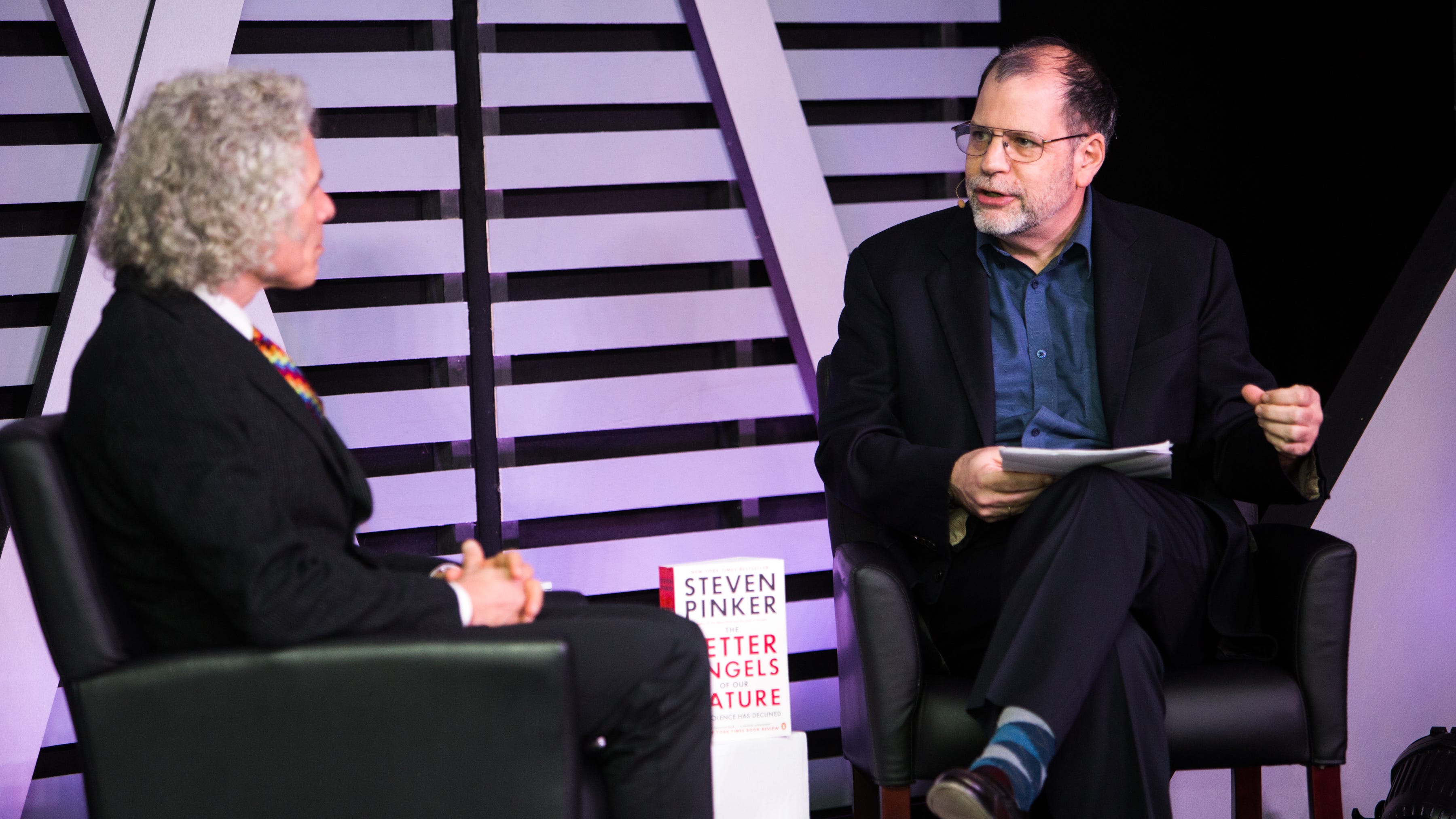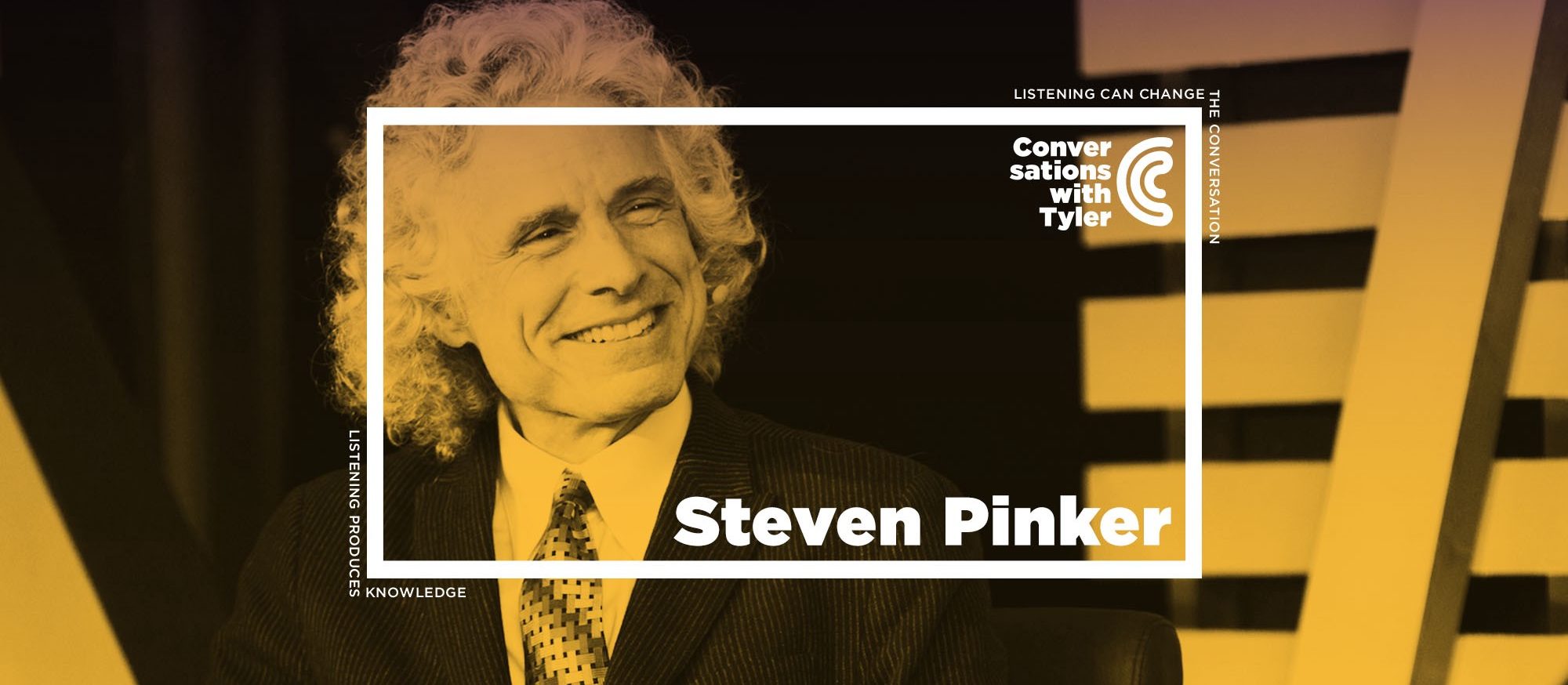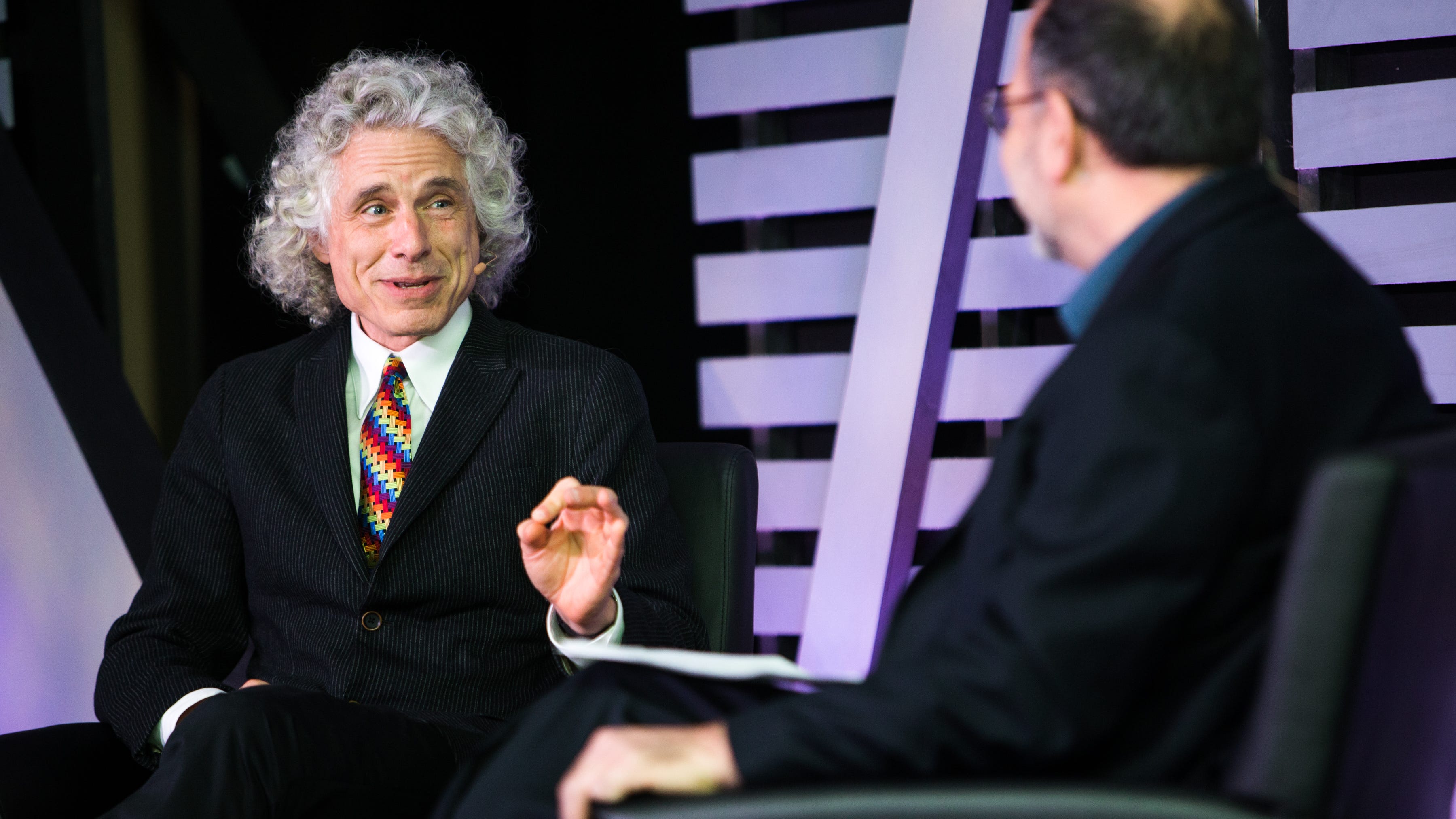Steven Pinker has spent an entire academic career thinking deeply about language, cognition, and human nature. Driving it all, he says, is an Enlightenment belief that the world is intelligible, science can progress, and through rational inquiry we can better understand ourselves.
He recently joined Tyler for a conversation not only on the power of reason, but also the economics of irrational verbs, whether violence will continue to decline, behavioral economics, existential threats, the merits of aerobic exercise, photography, group selection, Fermi’s paradox, Noam Chomsky, universal grammar, free will, the Ed Sullivan show, and why people underrate the passive (or so it is thought).
Watch the full conversation
Read the full transcript
TYLER COWEN: Steven Pinker has stridden into the room, and requires no further introduction.
[laughter]
On the economics of irregular verbs
COWEN: I’ve looked at a lot of Steven’s work again lately, and I’d like to start with your early work on irregular verbs. It’s striking to me how much in this work you think like an economist.
Some verbs are regular — you conjugate them with an -ed — others are irregular. You don’t say getted. You say got. How computationally efficient is that process?
STEVEN PINKER: [laughs] I think it taps two of the mechanisms that make intelligence possible. Why would I spend a good chunk of my career studying the minutiae of irregular verbs? I do love language. I love linguistic detail for its own sake, but I chose that topic because I thought it shed light on bigger issues of cognitive organization.
Why do we have 165 or so quirky exceptions like stride, strode; come, came; sing, sang; go, went; and so on? It just seems that there could be no rhyme or reason behind hit. I think it’s just a consequence of the fact that we memorize words, and that’s one of the two mechanisms behind language. We store by brute force, rote memory, arbitrary pairings between a sound and a meaning.
The word duck doesn’t look like a duck or walk like a duck or quack like a duck, but I can use it to get you to think the thought of a duck because we and everyone in this room has memorized a pairing between that sound and that meaning.
We don’t just blurt out words but we also combine them into phrases and sentences using rules that allow you to predict theme or compute the meaning of a combination from the meaning of the parts and the way that they are arranged. Those are the two mechanisms that make language possible. But there are some kinds of meanings where they can compete over which system expresses a particular concept.
In the case of regularity or irregularity, we have two different ways of conveying the concept “an action that took place in the past,” or in the case of plurals like mouse, mice and rat, rats, two ways of talking about more than one thing. We can memorize a more or less independent word to convey the idea like struck or sang, or we can apply an algorithm to say something in the past tense — add -ed to the end — and then we get walk, walked.
Because of the peculiarities of the history of a language, you can have that labor divided between the rule system — the algorithmic system — and the memory system, and it’s the tension between those two systems that gives rise to a lot of the quirkiness of language, including English irregular verbs.
COWEN: When you did this — this was one of the first things to make you famous — did you know in the back of your mind this was a kind of Hayekian argument? Because it seems to me the common verbs, that we use a lot, those go irregular, and it’s easy to remember them because you use them all the time. But the regular verbs are ones that you don’t use so often and thus, again, you’re economizing on information in this decentralized way.
PINKER: I don’t know how well that analysis would work across a range of zones of irregularity. It is certainly true that irregular verbs tend to be common, which is the bane of the language learner. You learn Spanish or French and all of the words that you use all the time, you’ve got to memorize the conjugations.
The reason for that is — I might even invoke Darwin more than Hayek — namely that in the generation-to-generation transmission process of an irregular verb, an irregular verb has to be memorized because, by definition, there is no rule behind it. The only way you know that the past tense of come is came is that you hear everyone else use came.
Since memory thrives on frequency — the more often you hear something, the better you remember it — if any verb declines in frequency (and verbs become more or less fashionable for all kinds of reasons), then you could have a generation that never successfully masters it. They’ll default to the all-purpose add -ed rule, and then the verb will go from irregular to regular for that generation and all subsequent generations.
You’ve got an erosion of the stock of irregular verbs as they get filtered through the minds of children memorizing them, where it’s the less-frequent ones that tend to fall out of the language.
COWEN: So dreamt becomes dreamed, for instance?
PINKER: Dreamt becomes dreamed.
COWEN: But dreamt is prettier.
PINKER: It is prettier, and that’s one of the reasons that irregular verbs do stay in the language. One of the reasons that often lyricists and poets and novelists will prefer the irregular to the regular when there’s a choice — strided versus strode, strove versus strived, hove versus heaved — is that they’re good words.
They actually fit the phonological template for a standard word in the language, the kind of sound that you would use for a nickname or a common word. They are more euphonious because they aren’t assembled in a kludgy way from the verb stem and this bit of detritus hanging on the end, this -ed, this suffix, which is serviceable — it allows you to convey a message — but it makes the sound of the word itself a bit clunky.
There are almost unpronounceable regular words like sixths or edited where, because you’re sticking an extra bit on the end of a word, you’re actually messing up the nice contour of a standard word in the language. That’s another one of the tensions that over the course of the history of a language will shape the balance of regular and irregular forms.
That is Hayekian in the sense that no one planned the language to be optimal in satisfying one criterion. There are tradeoffs. There are multiple tugs, pushes, and pulls. As millions of speakers make little adjustments, as they use the language, as kids learn the language, the language itself spontaneously evolves with some balance.
COWEN: Let me now put on my economist’s hat and ask you about this. As you know, in George Orwell’s 1984, the Party bans all irregular verbs. It’s a kind of excess regulation. But from a social point of view, are there too many or too few irregular verbs in English?
PINKER: [laughs] I like the irregular verbs. I’d like to see more of them.
[laughter]
PINKER: It is sad when we lose them. Occasionally, a new one gets a toehold in the language. Snuck, for example, is about 120 years old. It came in on the analogy of dig, dug; and stink, stunk; and sing, sang, sung; and strike, struck. What will protect a verb against erosion when it becomes too uncommon is similarity to other verbs. It’s another property of human memory.
One property of human memory is: you hear things a lot, they stick in memory better. Another one is: if it’s similar to other things that are well memorized, it can parasitize the memory strength of something nearby in phonological space.
Occasionally, there will be analogies. People will coin new verbs, sometimes in a jocular way. You’re invited to a party: “Spice are welcome,” instead of spouses. It’s a little bit jocular.
Sometimes these things can catch on, and that was the case for snuck, where originally it was considered kind of cutesy — like spice as the plural of spouse. In fact, people who are older than about 70 or 75 still think that it’s slang, whereas people younger don’t see what the fuss is about.
COWEN: Are there irregular verbs you’re afraid to use? Because I have this problem. Think of the word abide. I’m perfectly happy to say abide, but the past tense, abode, is thought of as a noun, a place —
PINKER: Yes, right.

COWEN: Then there’s abidden, and then there’s the noun, abidance, and I won’t go near any of those. Every now and then, you’ll be in a sense where the notion of abide comes up, and you’ll just stick with the present tense and do whatever circumlocution you need to avoid having to make these other irregular verb commitments. Or do you just go ahead and say stridden? “Steven Pinker has stridden into the room”?
PINKER: [laughs] Yes, right. Abode has not been in common usage for a few centuries so I mean . . .
[laughter]
PINKER: That’s one of those that dropped out, like chid as the past tense of chide, for example.
COWEN: Chidden, right?
PINKER: Yes, chidden, or holp as the past tense of help. Some of them survive in dialects, in Appalachia, in remote parts of the British Isles; forms that were in use a couple of hundred years ago may have resisted the erosion for reasons that are completely obscure, partly capricious.
One distinction that is vanishing that I think is sad is the three-way distinction in verbs like sink, sank, sunk; stink, stank, stunk; shrink, shrank, shrunk; where the shrank and the stank are giving way to their participle forms shrunk and stunk.
COWEN: No shrank and stank.
PINKER: No shrank and stank. Admittedly it would have been hard to have a movie called Honey, I Shrank the Kids instead of Honey, I Shrunk the Kids. In my style manual, The Sense of Style, I recommend hanging on to them. I think they’re nice.
It’s nice to have that three‑way distinction. English conjugation is already so depauperate, so degenerate, that it’s nice to preserve what distinctions we have.
On Chomsky and universal grammar
COWEN: Moving chronologically through your career, let me ask you a big‑picture question about language. I come to linguistics very much as an outsider.
Noam Chomsky’s idea of a universal grammar, which is somehow built into the structures of the human mind: in its early years there seemed to be a promise of some very definite accounting of what that structure would be. After a while it seemed to collapse into this very general idea of recursion, which to me as an economist seems almost tautological.
If I came away from this debate and then I read people writing within popular science: “Today language is a number of different capacities brought together. They’re independent and just combined with our ability to divine meaning from others.” Could it be the case that Chomsky’s hypothesis was simply wrong? 2016, I know your books, but what’s your take on that today?
PINKER: It’s not easy to pin down what the hypothesis is, partly because Chomsky himself revises his theory every decade or so, on a principle of Mao’s Continuous Revolution. Just never let people settle into any kind of comfortable consensus.
[laughter]
PINKER: It’s a moving target. Also, as you say, it was neither specified in a precise way nor field‑tested against a dataset of language variation, which I think is unfortunate in terms of ordinary scientific practice.
Linguistics is an eccentric field in some ways partly because it was so polarized by a charismatic figure [Noam Chomsky] and his opponents that it didn’t proceed in the ordinary direction of making the theory more precise, more testable.
With that caveat in mind, I think there is such a thing as, you can call it “universal grammar” in the following sense: that the child is biased to analyze the speech that he or she hears in particular ways. It does not simply record sentences verbatim.
That’s the memory half of the language system, but the algorithmic or computational or rule‑governed half tries to pull out combinatorial rules from the speech stream. There are certain kinds of rules and elements that a child is keyed to look for. That set of abilities would be what I would call (if I used the term) universal grammar.
There are commonalities across the world’s languages that come from the fact that language is created anew every generation by the minds of the children who construct it out of the data that they get from their parents and peers.
On the theory of mind
COWEN: Let’s turn from language to a closely related topic, theory of mind. Of course you’ve written a lot on this. We had Jon Haidt for one of these discussions, and he has this notion that in the mind there are these modules. They’re almost a bit independent. There’s an “empathy” module or a “being analytic” module.
If I understand him correctly, in our political discourse different modules take over. It’s almost not integrated with the rest of your brain. What’s your take on how unified cognition is? To what extent, say, are political discourse ruled by independent modules, or is that not how you think about it?
PINKER: The metaphor of the module comes from my former colleague Jerry Fodor, a philosopher and psycholinguist. It comes in different versions. You had Howard Gardner proposing a theory of multiple intelligences.
You have evolutionary psychologists proposing the metaphor of the mind as a Swiss Army knife. Now it’s more like a smartphone with a bunch of different apps. These can all be opposed to a view of the mind that would have a theory of everything, that there’s just one principle. “It’s all Bayesian statistics” or “it’s just the law of operant conditioning.”
COWEN: How about all just one big teeming mess but no modules?
PINKER: Modules never quite seemed like the best metaphor. There is structure or specialization. I don’t think the mind is spam. I don’t think we just have a homogeneous neural network in the skull. There is some organization.
The problem with the module metaphor is some of them are snap-in components with very limited channels of communication between them. I think that’s too strong, but I think it is reasonable to say that there are different faculties, to use an old‑fashioned word.
To choose a different metaphor, I think it may have been Chomsky who proposed that the mind is like a biological system made out of organs and tissues. When I was in high school I was taught, for example, that the blood was an organ.
Now the blood, of course, suffuses all of our tissues. You can’t draw a dotted line around it. It’s not like the rump roast and the flank steak at the supermarket cow display. Likewise the mind can have a specialization, and structure, and different components, without them literally being independent.
I would agree with Jon Haidt that there are different mindsets — there are different faculties, there are different ways in which we can analyze the same set of events — and that a lot of political disagreement consists of what frame of mind — if you want, what module — you use to analyze a particular issue.
You’ve got to acknowledge the complexity, the multiplicity of the mind even if you don’t subscribe to the strict metaphor of modules.
COWEN: What evolutionary purpose does a sense of self serve in human beings? Could you imagine human beings performing the same actions but being zombies, not saying to themselves, “Hey, I’m Tyler,” or “Hey, I’m Steven Pinker.”
We have this sense of self, however difficult it may be to describe or study scientifically, and that evolved. You’re a Darwinian. Where does that come from? Why is it there?
PINKER: I would distinguish, certainly, the self‑concept, self‑knowledge, from the issue of subjective experience. People often use the word consciousness to refer to both of these phenomena, namely self‑consciousness or self‑knowledge on the one hand and subjectivity or the qualitative nature of consciousness qualia, what it is like to feel something or taste something, on the other.
I think those are two different questions.
COWEN: I mean the latter.
PINKER: You mean the latter. As opposed to —
COWEN: Right. You can sit up and feel something, taste something, and say, “Hey, I’m Steven Pinker,” and know introspectively that you’re saying it to yourself.
PINKER: You could have subjective experience of redness and sourness and warmth and so on without it including some concept of yourself. Conversely, you could imagine an intelligent system, a robot, say, where there’s no one home, where it monitors its own state, it presents itself in certain ways, and, at least as far as we know, it’s not actually feeling anything.
Of course, we don’t know it and that may be the key. The philosophical problem of sentience or qualia or (sometimes called) the hard problem of consciousness I think might ultimately be a quirk of our own way of analyzing the world — that is, the mind reflecting on itself is naturally going to be puzzled by some aspects of itself.
We know from neuroscience that there is no aspect of consciousness that does not have some physical correlate. There’s no ESP. There’s no life after death. There’s no mysterious action at a distance. It’s all information-processing and neurons. Why it should feel like something to me to be that network of neurons, I don’t think we have a satisfying answer to.
It may not be a scientific puzzle at all. There are some philosophers who claim that it just isn’t a coherent intellectual question at all, Dan Dennett being the most famous.
For some people this is a kind of escape hatch from materialism and a way to bring back some notion of the soul. The problem there is that you’d expect the mind to have some kind of nonmaterial powers, which it does not have.
I tend to gravitate toward a view that sometimes has been credited to David Hume — Colin McGinn is the contemporary philosopher who has made it most prominent — sometimes I think misleadingly called “mysterianism.”
Tom Nagel in his seminal article, “What Is It Like to Be a Bat?” (whose title captures the essence of the problem), speculated in that article along the lines that I’m suggesting: namely, there may just be some facts about the universe that are true, and we’ll never be satisfied that we intuitively understand them. Not because there is some mystery in the sense of undiscovered scientific principle, but just that our very way of grasping reality might make certain things puzzling to us. Even though we know at a more explicit cognitive level that they’re true.
A heap of neurons that registers the environment, that organizes the information, acts on it, including a model of itself: from my point of view, it feels like something. Why that should be true? I don’t know.
Again, here I am inside me and almost by definition there are going to be some things about the view of me inside me that the me doing the view is not going to be able to articulate because the part that would do the articulating is part of the me trying to explain it.
[laughter]
PINKER: I think there are some cases where human intuition hits a wall and this is one of them. The nature of time. What could have been before the Big Bang, if that was the beginning of everything. How can the universe either be finite or infinite? There’s no reason to think that every aspect of reality will be intuitive.
There may be some aspects where our best science will give us a characterization and we’ll always scratch our head as we appreciate that it’s true, but it never feels totally satisfying.






